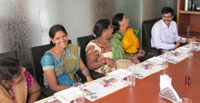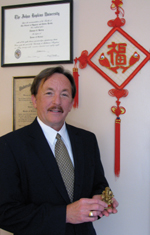|
By
Dawn Brazell
Public Relations
At 7 a.m.
here, it's noon in England, 4:30
p.m. in India and 7 p.m. in
Singapore.
Thomas Hulsey,
Sc.D., rattles off the times.
Arranging a Skype session among
the different locales is a feat,
but one he's adept in handling
as assistant dean for global
educational programs in the
College of Graduate Studies.
"Everybody is
able to visit at the same time.
It's a challenge. They can all
see the questions and hear the
answers, and they get to benefit
from what's going on in other
campuses."
Hulsey, who
has come a long way from his
Colleton County farming roots,
travels globally as he guides
the success of MUSC's Master of
Science in Clinical Research
(MSCR) global program. The
program now boasts four
locations of study in addition
to MUSC and has an 85-student
enrollment this fall.
 Faculty at the
Institute of Clinical Research
India in Hyderabad. Faculty at the
Institute of Clinical Research
India in Hyderabad.
Students in
the Institute of Clinical
Research India (ICRI) may choose
London, Singapore, Deharadun and
Hyderabad in India or MUSC as
their main campus for study.
There's also a collaboration
with the Drum Tower Hospital in
Nanjing, China, that sends
students to MUSC, and the MSCR
program is negotiating with a
sixth location: the Zhejiang
Hospital in Hangzhou, China.
"The exciting
thing is we've done this with no
advertising, no Web page and no
brochure. We wanted to go with
this very carefully and make
sure we had all the right
approvals and that we were
geared for this kind of global
delivery."
For Hulsey
that meant making sure the
technology team was on board;
the curriculum content was
modified for distance delivery;
and the Skype system adapted for
all locations just to name a few
of the logistic hurdles. The
faculty was challenged to come
up with new ways to deliver
curriculum, test students and
give exams. Students are
required to speak English.
Of the 85
students accepted, there will be
10 to 15 students who will be
coming to MUSC to study, he
said. "As we start to advertise
and start to build momentum, I
think the demand for this is
limitless at this point. We live
in an ever shrinking world. I
can be in Delhi in 14 hours by
plane. The world marketplace for
health care is getting
incredibly close. We don't live
in a vacuum anymore."
 Dr. Thomas Hulsey,
left, with a wall hanging that
was a gift from Chinese students
signifying good luck and
blessings. He's holding an image
of Ganesha, the Hindu God of
Success, a gift from an Indian
student. Dr. Thomas Hulsey,
left, with a wall hanging that
was a gift from Chinese students
signifying good luck and
blessings. He's holding an image
of Ganesha, the Hindu God of
Success, a gift from an Indian
student.
Medical trends
including medical tourism and
drug development encourage
cross-fertilization across
diverse cultures and
specialties, he said. Beyond the
possibilities for advancing
medicine, more diversity in
medical education encourages
cultural sensitivity, an added
benefit in delivering quality
health care.
Hulsey said
the MSCR program was originally
developed around the needs of
the MUSC family to enhance the
ability of clinical researchers.
The 38-hour credit program has
since expanded to be more than
just that.
"It challenges
us to think of new ways and new
materials to make our content
fresh — to make our content not
only match what's needed in the
domestic marketplace from what
our NIH guidelines are but
what's going to be in the global
marketplace as we look to
pharmaceutical industries and
public-private partnerships with
everybody else who's involved in
this whole health arena."
Impressed by
what students bring to the table
during discussions, Hulsey said
the classes benefit not only
from the diversity of students'
cultural perspectives but also
from the wide range of medical
specialty areas that are
represented. He has no doubt the
program will continue to grow,
given the enthusiastic support
of central administration and
faculty, who have opportunities
to travel to other countries and
collaborate in campus
environments that they are not
used to, he said.
There also is
a domestic marketplace for the
MSCR program from smaller
universities not able to provide
this kind of training on site.
The technology and abilities of
distance learning changes how
and what students can learn in
the comfort of their own small
communities, he said.
One advantage
of the MSCR program is that
academically it is a part of CGS
and administratively it is part
of the South Carolina Clinical
and Translational Institute, so
it has access to the resources
of both groups. The program
specifically was designed to
avoid a one-person-at-a-time
degree.
"We're heading
to closer collaboration. We're
building partnerships. Every
place we go is building a
partnership with the campus, or
the hospital or another
university so we can build with
them using the MCSR. We have
great collaborations that have
taken place with our physician
researchers now that we have
individuals going to these
hospitals and universities
spending time doing research.
It's opening the door to entire
global collaboration."
For
information, email Hulsey at
hulseytc@musc.edu or visit the
MSCR website at http://tinyurl.com/3uc68zu.
|



 Faculty at the
Institute of Clinical Research
India in Hyderabad.
Faculty at the
Institute of Clinical Research
India in Hyderabad.  Dr. Thomas Hulsey,
left, with a wall hanging that
was a gift from Chinese students
signifying good luck and
blessings. He's holding an image
of Ganesha, the Hindu God of
Success, a gift from an Indian
student.
Dr. Thomas Hulsey,
left, with a wall hanging that
was a gift from Chinese students
signifying good luck and
blessings. He's holding an image
of Ganesha, the Hindu God of
Success, a gift from an Indian
student.